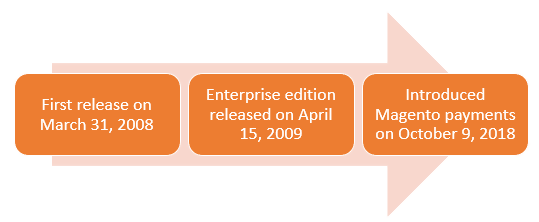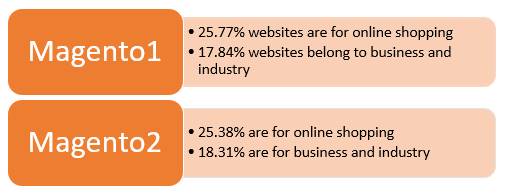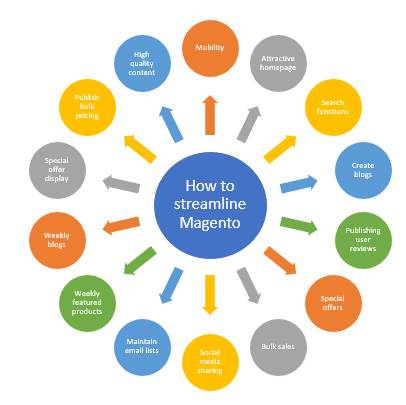Magento Statistics And Facts For 2020

Magento entered the world of eCommerce on March 31, 2008, and ever since the first release it has made history by emerging as a leading open source e-commerce platform. Equipped with robust features like omni-channel marketing, strong inventory management, and CMS, Magento is the first choice of businesses, small or big.
Overview of Magento Statistics, Usage, Marketshare 2020 (report)
Small businesses find in Magento an excellent eCommerce solution that can help them to build and scale up an eCommerce website from scratch without any hassles. Many of its advanced features are designed to resolve some of the key issues faced by online businesses, like user segmentation and customization. Besides that, an added advantage of Magento is that it is SEO friendly and secure against online threats.
Remarkable success:

The extraordinary success of this platform shows in the number of users it has to its credit. Having recorded 237,975 users in 2019, big chunks of the users are from the US. It is also the preferred choice of the 1,000 leading retailers in North America and includes famous names like Adidas and Walmart.
The success of Magento can primarily attribute to the huge volumes of traffic it can handle without any negative impact on the performance. Just imagine the potential of this platform with an ability to process more than 80,000 orders every hour. Whatever the size of the business small, medium or big, Magento can handle any volume of transaction. Since Adobe promotes it, you can expect Magento to grow stronger by day and come up with improved functionalities for its customers.
History

How Magento evolved is quite an interesting story and worth a mention. It goes like this. The USA based Varien Inc founded Magento, and its first release was on March 31, 2008, and the enterprise edition got released on April 15, 2009.
By 2010, Magento already recorded its success with 1.5 M downloads. On June 6, 2011, eBay acquired it and later sold it to Permira. June 19, 2018, marked the entry of Adobe. This multimedia giant acquired Magento from Permira with the idea of integrating it with Adobe Experience Cloud. Magento made a big leap on October 9, 2018, by introducing Magento payments. By 2020 the sales on the Magento platform are projected to reach $224 B and the Magento economy to touch $13.6 B.
Did you know that:
- Bento was the first name of Magento, and the name changed due to copyright issues.
- The game Dungeons and Dragons are the reason behind the inspiration of the name and logo of Magento.
- The official community forum of Magento has over 400,000 users.
- The term Magento has more searches online than e-commerce
- When Devlyn sold glasses online through Magento, their mobile conversion increased by 271%
Magento Open Source and Magento Commerce:
Depending on the need of the customer, Magento offers two solutions, Magento Open Source, and Magento Commerce. Everyone can download the Magento open-source platform free of charge, and the functionalities of the platform can extend according to the requirements of the website by adding plugins. Magento Commerce is an on-premise solution that comes with a fee. But compared to Magento Open Source it has additional features and enhanced functionalities to suit the needs of big businesses.
The popularity of Magento:
Magento’s demand is growing day by day. Every day the number of Magento downloads is increasing. In 2016 there were 5,00,000 + Magento downloads, and the volume is still going high. It is the seventh popular CMS in the world with a market share of 1.9 % second only to Shopify.
One of the key markers of the success of an e-commerce platform is the number of buying users. Magento is quite user-friendly, and this shows in the fact that the number of users who exit from the website without making a purchase is only 10%. Around 40% of the visitors make a purchase. The abandonment rate of the shopping cart in Magento 2 is only 69.23%.
- The highest numbers of Magento users are in the US with 82,277 users, followed by the UK with 19,101 users.
- Magento usage has almost doubled from 2017 to 2018.
- Magento has benefitted the merchants using it, with most of them experiencing a 3 times faster growth. You can find 60% of Magento merchants on Amazon.
- Every day you have an impressive 5K downloads of Magento.

Around 25.77% of Magento1 websites are for online shopping. 17.84% of the websites belong to business and industry. Magento2 also has 25.38 % for online shopping and 18.31% for business and industry.
Some more interesting facts:
- Continuously for four years, Magento has been the #1 in the Internet Retailer 1000 list
- Again, Magento is #1 in the Internet Retailer B2B eCommerce 300 list pushing behind 42 competitors
- Last year alone over 7,500 customers of VirtueMart, osCommerce and OpenCart migrated to Magento
- Magento powers 1% of the internet
Magento and Themes:
While many of the competitors do not focus on themes, Magento became a pioneer in emphasizing the importance of themes. Magento themes are easy to use, and many choices are available to suit the different requirements. You can buy the themes from the Magento market place with prices ranging from $29 – $499. Sneaker, Digi, James, Axon, Infinit are some of the popular responsive themes in 2018.
If you look in Themeforest, you will be surprised to find 700 easy to install themes with preinstalled extensions for any additional customizations. You can get most of these themes from independent developers. These themes help the businesses to customize the platform as per the needs of their customers, allowing them to enhance customer experience and to evolve a brand identity as well.
On average the themes come with 9 extensions to use. Magento provides over 5,000 extensions of which 2,367 are for Magento2 and the remaining for Magento1. Using these extensions and the numerous options available, you can easily expand your store, its functions, and capabilities. The majority of the themes are free and the basic price of paid themes starts from $50.
However, it won’t recommend using extensions from the open market. Because these carry security risks and being an eCommerce platform secure environment is one of the primary concerns of the users.
How expensive is Magento?
Magento is quite affordable comparing to the immense benefits it offers. The time to recover your investment on Magento is around 5.2 months. Meaning in less than a year, you can recover the investment cost of Magento by having increased sales through the e-commerce platform.

Magento2 community edition is free and best suited for small businesses. Magento2 enterprise edition comes in the price range of $ 22K – $ 125K. The Magento2 enterprise cloud edition comes in the range of $40K- $190K.
Magento is not very expensive to host too. You can get an unmanaged hosting for $10, and the price can go up to $250 per month. The starting price of managed hosting is around $30 per month. If the website uses Magento commerce, then for a dedicated server, you might have to pay $500 per month. The fee per user is also only $45 per month.
So, building a webshop with Magento should not be complicated or expensive. You can have excellent support from developers. A global base of 200,000 developers ensures that you can reach out to professional help at any time.
If you can hire an agency to develop Magento, it might cost anywhere around $20K – $60K. A freelancer from the US might charge $150- $500 hourly while someone from South-East Asia will require only $10- $20 per hour to do the same. And you can always turn to the trusted source of 3.8K certified developers in Magento’s directory for professional assistance.
Advantages of Magento:

Magento has some of the big names in its customer list like Coco-Cola, Ford, Fox Connect, Olympus, Jaguar, Rebacca Minkoff, Warby Parker, Christian Louboutin, Rubiks, Nike, Vizio, and Nestle Nespresso. This stupendous success is mainly due to the advanced functionalities along with the emphasis on customization and usability that Magento offers.
Another benefit of using Magento is that comparing SaaS solutions; you have complete ownership of your website or application. Magento is also mobile friendly with additional functionalities built in for the same. You can easily segment your customers with Magento, and this helps to streamline the business efficiently. Being an online eCommerce platform, Magento also offers SEO friendly features and enhanced security to improve customer trust on the website.
Network partners and customer support:
Magento has out proven its competitors. The growth of the businesses using Magento is better than the users of the competitors when you consider customer reach and transaction value. It has proved statistically. Magento also has an attractive partnership offer which has attracted 1,300 partners worldwide. This extensive network of partners helps Magento to provide its customers with support in implementation, design, troubleshooting, and merchandising. The customers also get to use the most updated technologies in Magento.
Magento has been empowering eCommerce businesses since its launch with several noteworthy and innovative functionalities. The robust eCommerce platform gives a growth rate better than the market to its users. It is the preferred choice of some of the big businesses globally. You can see that Magento has a 16 % share of the leading 10K eCommerce stores and 11% of the users of Magento are from the US alone.
The power of Magento for increasing sales:
Conversion is the only mechanism to increase online sales, which will eventually bring more revenues. Magento with many advanced features can help to improve sales and earn more revenues. Let us check some of its key features and options.
- A wide array of pre-packaged themes, which can effectively use for the sites.
- Custom design features.
- Options to manage metadata descriptions effectively.
- Easy to integrate Magento with other programs, including MailChimp.
- Uninterrupted order tracking features.
- It can showcase multiple product photos.
- In-built multinational currency interface features allowing people to transact in various international currencies.
- Multiple payment options.
- “Magento Mobile” – the mobile version for the improved transaction while on the move.
- User-friendly interactive features for effortless navigation.
- Excellent shipping and checkout features.
The availability of these stellar features makes Magento one of the best open-source e-commerce platform, attracting entrepreneurs all across the globe. Magento is a proven e-commerce platform, and because of this very reason, online companies use this platform for taking advantage of Search Engine Optimization. Its conversion rate is very high, and that is the reason many new online entrepreneurs utilize this platform business conversion. The Magento integration system is hassle-free, and it can sync with any existing Customer Management System.
How can you streamline it?

Magento features with a broad platform for e-Commerce operations, based on open-source code. It has greater scalability. Users can download the free version and later upgrade to enterprise-level software. It is a good option because the free version will give enough exposure to the user to understand its utilities and then move to the advanced version.
Its sober CMS features help online entrepreneurs to establish their presence in the market. The following features will help to enhance your online activities by Magento.
Mobility: Magento functions smoothly on almost all types of cell phones, other mobile gadgets. However, make sure the version that you are using is compatible with the cellphone, and it can load quickly and helps to optimize the SEO ranking of the site.
Attractive homepage: Its features can add value to the site and help to promote the product quickly. You can do this by placing exciting themes and beautiful home page design. An attractive home page will prompt visitors to revisit the site. So naturally, you can expect more business.
Search functions: After installation of the site, simply tweak the website with Magento CMS, which can enable the customers to use the search function to identify the products and compare them with other products.
Create blogs: Develop blogs on Magento platform. Relevant content will seduce visitors to revisit the site for material information and business conversion.
Publishing user reviews: Magento offers helpful user reviews. The reviewing segment showcases much useful information in the form of reviews, which are helpful for customers to make the decision when they plan to buy a new product.
Special offers: It features many business promotions. Many a time, you can find special discount rates and purchase incentives.
Bulk sales: It is an excellent site to place bulk sales options. With the bulk pricing features, you will get a rare opportunity for a bulk purchase order. So, there are always chances to clinch a significant transaction, which may happen once in a blue moon.
With so many features, Magento will never let you down. Many e-Commerce companies are using Magento as an additional/secondary e-commerce platform to support their online activities. Its features are great, and it has higher conversion abilities. The site’s conversion abilities are one of the standout features, and as a result, the eCommerce companies can experience significant revenue growth. It is the best option for online e-commerce ventures and if you need better conversion then include Magento to your online retailing business. You will never go wrong with Magento.
More To Explore
Wearable Statistics And Facts For 2021
Industry report Overview of Wearable Statistics And Facts For 20211
Facebook live Statistics, Usage And Facts (2020 Report)
Industry report Overview of Facebook live Statistics, Usage And Facts
Web Hosting Statistics, Market share And Facts For 2021
Industry report Overview of Web Hosting Statistics, Market share And
Explore Related reccomendations
Etsy Statistics, Users, Usage, Demographics (2021 Report)
- According to 0 users
TikTok Statistics, Usage And Facts (2020 Report)
- According to 0 users
Telegram Revenue and Usage Statistics 2020 report
- According to 0 users
Apps Statistics, Usage & Downloads (2020 report)
- According to 0 users


